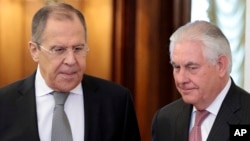U.S. Secretary of State Rex Tillerson said Monday that Russian interference in last year's presidential election created “serious mistrust,” and that he and Russian Foreign Minister Sergei Lavrov discussed “a lot of work” that has to be done regarding U.S.-Russia relations.
The two top diplomats held talks on the sidelines of a regional forum in the Philippines where Tillerson said he told Lavrov the U.S. will respond by Sept. 1 to Russia's order to remove hundreds of diplomats and other staff from U.S. diplomatic facilities in Russia.
“I told the foreign minister that we had not made a decision regarding how we will respond to Russia's request to remove diplomatic personnel,” Tillerson said.
First meeting since sanctions announced
The meeting was the first high-level contact between the two countries since U.S. President Donald Trump last week reluctantly signed new sanctions into law to punish Russia for interfering in the 2016 presidential election to help him win.
Lavrov said that despite the latest round of U.S. sanctions, “We felt that our American counterparts need to keep the dialogue open. There's no alternative to that.”
The U.S. Congress voted overwhelmingly for the sanctions. Trump, faced with the likelihood that Congress would override a veto if he rejected the legislation, approved the sanctions measure even as he called it “significantly flawed” with “clearly unconstitutional provisions.”
Former U.S. President Barack Obama, weeks before he left office, expelled 35 Russian diplomats and closed two Russian facilities in the United States after the U.S. intelligence community concluded that Russian President Vladimir Putin personally directed the election interference.
Russia official explains staff cuts
Russia did not retaliate at the time, but with the approval of the new sanctions, Moscow ordered the U.S. to cut 755 diplomats and staff workers, many of them Russians, from its embassy and consulates in Russia. Lavrov said he explained to Tillerson how Moscow would carry out the sharp cuts in the U.S. diplomatic missions, but did not publicly disclose any details.
Trump has been largely dismissive of the investigations in Washington over the Russian election interference, calling them a “witch hunt” and an excuse by Democrats to explain his upset victory over his Democratic challenger, former U.S. Secretary of State Hillary Clinton.
Numerous congressional probes are underway, while Special Counsel Robert Mueller has opened a grand jury investigation into whether Trump campaign aides illegally colluded with Russian interests on Trump's behalf in the election and whether Trump obstructed justice when he fired former Federal Bureau of Investigation chief James Comey, who was leading the agency's Russia probe before Mueller took over.
Volker to meet with Russians
Lavrov also said Sunday that the U.S. is soon sending its envoy for negotiations over unrest in eastern Ukraine to Moscow for talks about the ongoing violence.
He said U.S. diplomat Kurt Volker would meet with Russia's envoy for the Ukraine crisis, Vladislav Surkov. Volker last month visited eastern Ukraine, where Russian-backed separatists have been fighting Kyiv's forces for more than three years. It is a conflict during which Moscow annexed Ukraine's Crimean peninsula and more than 10,000 people have been killed.
Tillerson in his comments to reporters said Russia is showing “some willingness” to start discussing a resolution to the Ukraine crisis. He said the U.S. and Russia have deep differences, but that it's not a good idea to “just cut everything off on one single issue.”





